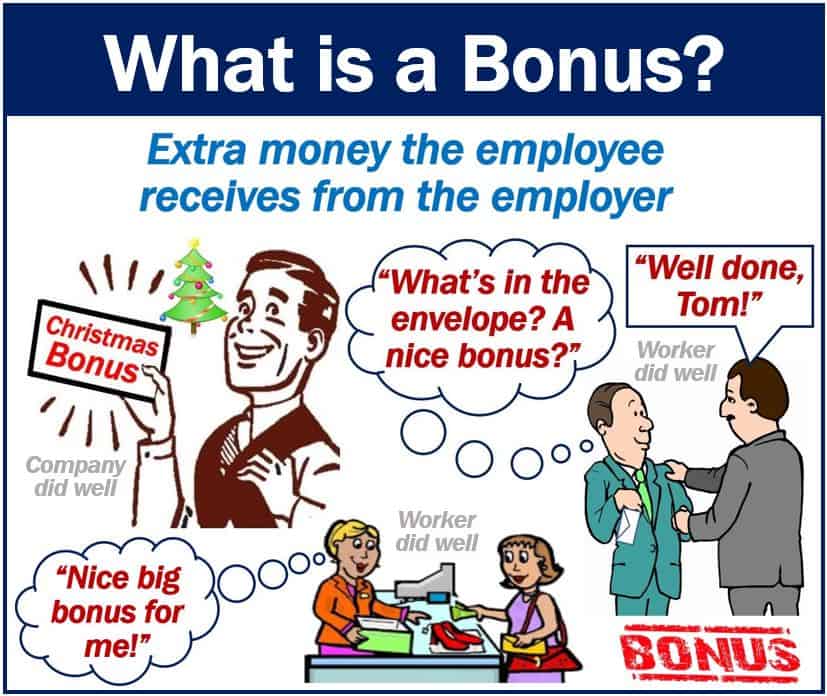What is a bonus? Definition and example
A Bonus is extra money that an employee receives on top of his or her wages or salary. The person may receive the extra payment for good performance. Sometimes, all employees in a company receive extra money at a certain time of the year. For example, if they get an extra payment at Christmas, it is a Christmas bonus.
A company may give its shareholders bonuses, as in: “Acme Limited is set to give its shareholders a bonus of $1 per share.”
Insurance companies give customers bonuses if they have a very profitable year.
In a general English, non-business context, the term can mean a benefit or advantage. For example, I might say “The proximity to shops is an added bonus, but the real appeal is the incredible view.”

Companies that participate in ‘gains sharing,’ give their employees bonuses when profits or productivity increase.
The term does not mean the same as profit sharing, which occurs when a company gives its workers a percentage of its profits on top of their salaries.
Bonus vs. commission
Both terms refer to payments that employers make to employees on top of basic wages and salaries.
However, commissions are usually based on the employee’s performance, while bonuses are based on the business’ performance.
This is not a strict rule. Sometimes people get bonuses because they performed well. It depends on how a company uses the term.
Put simply, bonuses may relate to either the employee’s or company’s performance, but not commissions. Companies only pay a commission when an employee has performed well.
In other words, the term ‘bonus’ may mean ‘commission,’ but ‘commission’ never means ‘bonus’ when it refers to the company’s performance.
-
Commission in a shoe shop
For example, a saleswoman who sells shoes may get a 10% commission on sales. This means that if she sells a pair of shoes for $100, she’ll get a commission of $10. Some companies may also call this a bonus (less common).
If the shoe shop chain has a good year, it may give all of its employees a bonus. We do not call this a commission, because it relates to the company’s performance, not the employees’.
Smarta.com says the following regarding the two terms:
“Commission and bonuses are payments made on top of basic wages and salaries.”
“Commission is generally based on the performance of an individual or team and are commonly applied to sales people, whereas a bonus is more likely to be linked to the performance of your business over a certain period of time.”

Fat-cat bonuses – banking
After the Global Financial Crisis of 2007/8, governments had to bail out hundreds of banks across the world. Trillions of dollars of taxpayers’ money were used to save banks.
Many top banking executives received generous bonuses. When taxpayers and shareholders found out that executives continued paying themselves bonuses after the bailouts, they were angry.
Taxpayers protested and shareholders rebelled. A shareholder rebellion occurs when shareholders vote against the board of directors.
In 2014, for example, Barclays’ board voted to increase its staff bonus pool by 10%. However, profits had declined by 30% that year. Standard Life, a major Barclays shareholder, voted against the proposal.
In the UK, ‘fat cats‘ refers to top executives who pay themselves generously, even when their companies are failing. It is a derogatory term.
Getting customers to buy more
We sometimes use the term when talking about an incentive scheme we aim at customers. It could be part of a customer motivational program to encourage them to buy more of the company’s products.
Some companies call it an incentive program or bonus scheme.
Compound nouns with “bonus”
There are many compound nouns containing the word bonus in the English language. Below you can see seven of them, each with a definition, and an example sentence to show how they can be applied in everyday situations:
-
Bonus Structure
A system or set of rules that determines how bonuses are allocated within an organization.
Example: “The company’s bonus structure is designed to incentivize exceptional employee performance.”
-
Bonus Payment
An additional sum of money given to an employee on top of their regular salary.
Example: “She received a generous bonus payment for her contributions to the project’s success.”
-
Bonus Points
Extra points awarded for an achievement or as a special reward.
Example: “By completing the survey, customers can earn bonus points to use towards future purchases.”
-
Bonus Round
An additional round in a game or competition that gives participants a chance to increase their winnings or score.
Example: “He advanced to the bonus round where he had the opportunity to double his winnings.”
-
Bonus Scheme
A planned program to distribute bonuses based on specific criteria or achievements.
Example: “The year-end bonus scheme was clearly outlined in the employee handbook.”
-
Bonus Offer
A special offer that provides additional value or discounts, often used to attract customers.
Example: “The new credit card came with a bonus offer of 10,000 free air miles.”
-
Bonus Track
An additional song or piece of music included on an album that is not part of the regular track listing.
Example: “Fans were excited to find a bonus track on the artist’s latest album, featuring a collaboration with a famous singer.”
Video – What is a Bonus?
This video presentation, from our YouTube partner channel – Marketing Business Network, explains what a ‘Bonus’ is using simple and easy-to-understand language and examples.

